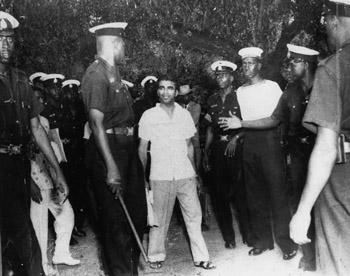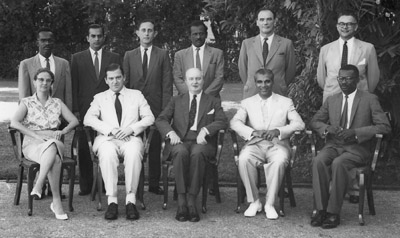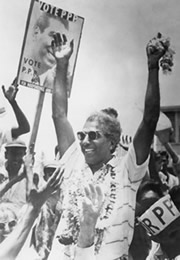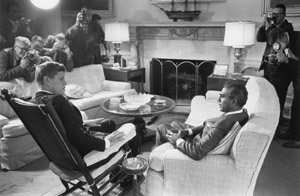Biography of Dr. Cheddi Jagan
 Iron Rule and Treachery
Iron Rule and Treachery

Cheddi Jagan being arrested in1954
"Today," he declared, "Guyana is a vast prison. Whether I am outside or inside matters little. Prisons hold no terror for me. I expect no justice from this or any other Court. Justice has been dead since the British troops landed. I am hoping for the day when there will be greater justice in Guiana."

"Thunder" articles by
Dr. Jagan about this period
Dr. Jagan about this period
When the British thought it had everything under control, and had manipulated the constituency boundaries, it held general elections in 1957. The results astonished them and proved to all who had the support of the people. The PPP won 9 of the fourteen seats, the PNC three. In fact the votes received by Cheddi Jagan were more than the combined support of the 5 opposition seats.
Read more about this period: A Piece Of Guyana's History by Janet Jagan
 In Office but Not in Power
In Office but Not in Power

Members of the 1957 Cabinet with Sir Ralph Grey
During the period from 1957-1961 Cheddi Jagan had the opportunity for the first time to embark upon the program of social and economic reform for which he had advocated over the years.
Although the PPP did not hold the main Ministries of Finance, Foreign Affairs and Administration, it was successful in opening up agriculture, providing benefits to workers and improved the health and education system. Because of its goals reached and its representation to the working people, it had no problems winning the 1961 general elections.
It was Dr. Jagan's dream that all Guianese would have a chance at attaining a higher education and that is how the University of Guyana was opened in 1963, on a shoe string budget. Classes were held after school hours at Queen's College and because of this critics called it "Jagan's Night School." It would be impossible to contemplate the University education in Guyana without paying tribute to its architect, Dr. Cheddi Jagan who had the vision and the commitment, in the face of militant opposition, to persevere in its realization. The University started then with 164 students; and by a strange coincidence, a similar number laid the foundations of the Berbice Campus which was opened in November 2000.
On the constitutional front the PPP embarked on a campaign for cabinet status and independence. This fight for Guyana’s independence had remained the core objective of the People’s Progressive Party from its conception.
 The Fires Started
The Fires Started

Cheddi & Janet Jagan
after winning
the 1961 General Elections.
the 1961 General Elections.
Cheddi Jagan was asked to form the government and was designated Premier and Minister of Development and Planning. On October 25, 1961 Cheddi Jagan met with President John F. Kennedy in Washington. On December 18, 1961 he addressed the 4th Committee of the United Nations calling for the British Government to decide on a date for Independence. His address set a precedent at the United Nations in allowing other delegates from non-self-governing countries the right to address the UN as petitioners.
The next three years, 1961-1964, were a period of strife and disturbances, the principle object being to remove the PPP from government and to prevent Independence while they were in power, even though it had been understood that the party that won the elections would lead the country to Independence.

Meeting with President Kennedy in 1961
/Addressing the United Nations in 1961
/Addressing the United Nations in 1961
The pretext for the riots and fire in February 1962 was the PPP budget with new taxation proposals. These same tax proposals were described by the New York Times as "courageous and economically sound" and by the London Times as also "courageous and certainly not far from what Guiana must have."
The disturbances failed to bring down the PPP Government, but they succeeded in postponing the Constitutional Conference slated for May 1962 to October 1962. The PNC and UF opposed independence and called for new elections under a system of proportional representation. The PPP rejected this call but put forward many other compromise proposals. Talks broke down. The breakup of the 1962 Conference was the signal for the violence of 1963.
